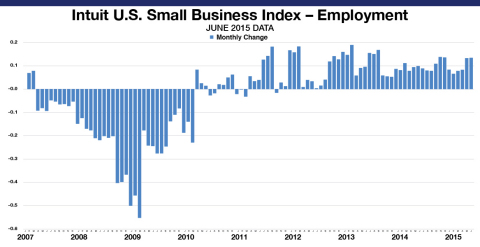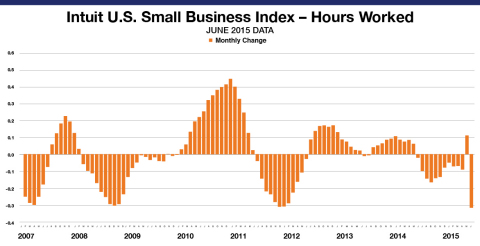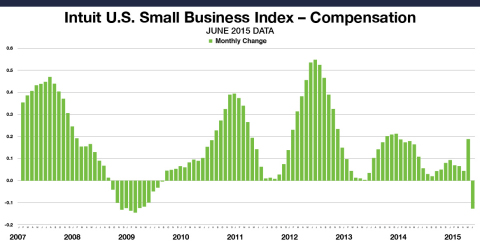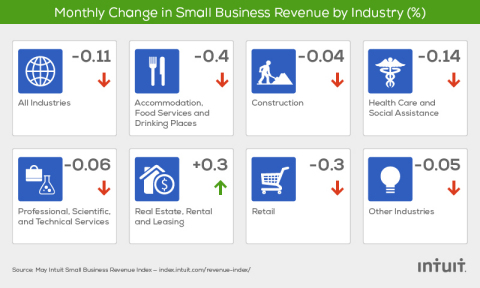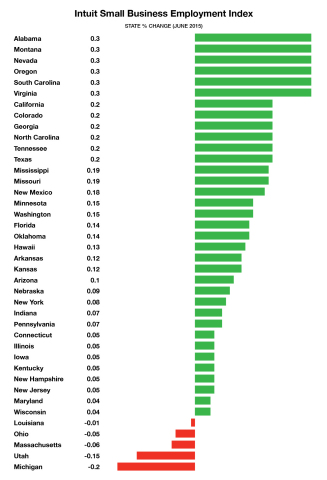MOUNTAIN VIEW, Calif.--(BUSINESS WIRE)--Intuit Inc. (Nasdaq:INTU) issued its monthly Small Business Employment and Revenue Indexes. Below are topline results from each of the reports.
Small Business Employment Index – June
- U.S. small businesses added 25,000 new jobs, making for more than 980,000 jobs added since March 2010 and a steady employment growth of 0.13 percent for the month.
- Hourly employees worked an average of 108.8 hours, a decrease of 20 minutes from May’s revised figure.
- Small business employees’ monthly pay decreased by 0.13 percent – the equivalent of $4 – with average monthly compensation reaching $2,812.
These findings come from the monthly Intuit QuickBooks Small Business Employment Index and are based on data from Intuit Online Payroll and QuickBooks Online Payroll, covering the period from May 24 – June 23.
Small Business Revenue Index – May
- Revenue per small business declined 0.11 percent across all industries. That translates to an annualized decrease of 1.3 percent.
- The Real Estate, Rental and Leasing category showed the only increase in monthly revenue, at 0.3 percent.
- The Accommodation, Food Service and Drinking Places category posted the largest revenue decline, falling 0.4 percent.
This index is based on data from QuickBooks Online, covering the period from May 1-31.
A Closer Look at Results
- The Small Business Employment Index
Small business employment rose by 25,000 jobs in June, an increase of 0.13 percent, matching the gains seen in May. Although the hiring rate fell slightly, it should not be regarded as a reversal of the upward trend that began in June 2009.
Hourly employees worked an average of 20 minutes less and were paid slightly more – just one cent – than in May, an increase of 0.06 percent. The number of hourly employees who work full time fell from 29.9 percent to 29.7 percent. Susan Woodward, the economist who works with Intuit to produce the Indexes, said this is the largest drop in the number of full-time workers since 2005.
“Small business employment remains 500,000 below the peak of 21.2 million people employed by small businesses in March 2007,” said Woodward. “Part of this continuing shortfall is because housing construction has failed to return to pre-crisis or even normal levels.”
“A sign of stronger small business activity is the hiring rate, which has been rising slowly but steadily since September 2009. The hiring rate always exceeds the employment increase because hiring reflects replacing workers who leave, as well as added workers,” Woodward said.
Small business hiring increased in nearly all the states tracked by Intuit QuickBooks, with the largest gains in Idaho, Virginia, South Carolina, Oregon, Montana and Alabama. Five states posted declines, with the largest drops in Michigan, Utah and Massachusetts.
- Small Business Revenue Index
Revenues per business declined overall in May, following an increase in April. The decrease for May was 0.11 percent, extending the 2014-2015 winter mini-recession and contributing to a total decline of 0.6 percent since October 2014. Real Estate, Rental and Leasing businesses were the only industry group to see revenue grow by 0.3 percent.
Despite the winter decline, small business revenues per business are 1.3 percent higher than a year ago. All industry groups have posted increases over the last year, from 3 percent for businesses in Construction, to 0.5 percent for Accommodation, Food Service and Drinking Places.
About the Intuit Small Business Indexes
The Intuit Small Business Indexes provide unique, near real-time information each month on the activity of the smallest businesses in the U.S. in terms of revenue, hiring and compensation trends.
The Employment Index is based on anonymized, non-identifiable aggregated data from approximately 255,695 small business employers, a subset of users that use Intuit Online Payroll and QuickBooks Online Payroll. The Revenue Index is based on anonymized, non-identifiable aggregated data from approximately 150,000 small businesses, a subset of users that use Intuit’s QuickBooks Online financial management offering and are matched in Dun & Bradstreet’s small business industry classifications.
Together, the indexes provide a more complete picture of the economic health of the nation’s small businesses. More information on the Intuit Small Business Indexes is available at index.intuit.com.
About Intuit Inc.
Intuit Inc. creates business and financial management solutions that simplify the business of life for small businesses, consumers and accounting professionals.
Its flagship products and services include QuickBooks®, Quicken® and TurboTax®, which make it easier to manage small businesses and payroll processing, personal finance, and tax preparation and filing. Mint.com provides a fresh, easy and intelligent way for people to manage their money, while Demandforce® offers marketing and communication tools for small businesses. ProSeries® and Lacerte® are Intuit's leading tax preparation offerings for professional accountants.
Founded in 1983, Intuit had revenue of $4.5 billion in its fiscal year 2014. The company has approximately 8,000 employees with major offices in the United States, Canada, the United Kingdom, India and other locations.


